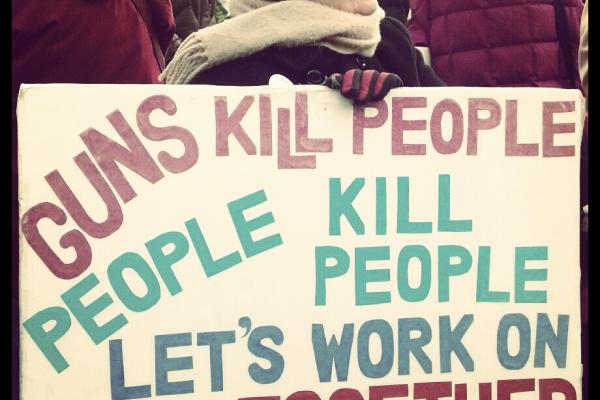Over the weekend I joined more than 6,000 people in a march for common sense gun control legislation.
The ground was covered in snow and ice, air so cold we could see our breath, on Saturday morning as we marched silently from the Capitol Building to the Washington Monument. In front of me, 100 residents from Newtown Conn., carried signs that read, “We Are Sandy Hook.” By my side stood an elderly woman with a sign reading, “Guns kill people. People kill people. Let’s work on both TOGETHER.”
Behind me, beside me, and scattered throughout the crowd of silent marchers more than 1,000 simple white signs were also displayed — carrying the names of victims of gun violence who have been permanently silenced.
They were names like Charlotte Colton, a mother of three who was gunned down along with seven other people at a U.S. Postal Service facility in Goleta, Calif.
Names like Laura Webb, who was shot and killed in a salon while styling her mother’s hair in a massacre that killed eight people.
Names like Vanessa Quinn, 29, one of four victims gunned down in a mall in Utah while she was picking out her wedding ring.
Names like Tshering Rinzing Bhutia, a recent immigrant from the Himalayas and one of seven people killed in a shooting spree at a Christian university in Oakland, Calif.
Names like Jack Pinto, a six-year-old child from Sandy Hook Elementary, who died along with 19 other children and several adults last month when a man opened fire in his classroom. He was buried in his favorite New York Giants shirt.
The sea of names around me went on: Dwight R. Nicholson and Robert Alan Smith from Iowa University. Clodine Delphia from the Luby’s Diner massacre in Texas. Victor Maxmillian Rivera. Quintin Turner. Sylvia Crowell. Kevin James. Ronald Midgely Grogan. Alicia White. I myself carried a sign with the name Jerrett Garnett, a 34-year-old man from Monks Corner who was shot and killed when bullets flew through the walls of his home recording studio.
The sheer volume of names and tragedies being represented at the march was almost overwhelming. So many people, all with their own stories, their own families, all with their own hopes and dreams for the future. So many people now dead.
Among the speakers at the post-march event was Colin Goddard, a survivor of the 2007 Virginia Tech massacre. Colin was one of only seven people to make it out of his classroom alive. He was shot four times – once above the knee, twice in the hip, and once in the shoulder — but he considers himself one of the lucky ones. “I'm not here today because of what happened to me. I'm here today because I kept seeing what happened to me happen to so many other people.”
In response to the idea that arming teachers is the solution to tragedies like the recent Sandy Hook shooting, Goddard declared, “We need to challenge any politician who thinks it's easier to ask an elementary school teacher to stand up to a gunman with an AR-15 than it is to ask them to stand up to a gun lobbyist with a checkbook.”
Washington, D.C., Rep. Eleanor Holmes Norton also spoke at the event, reminding marchers that change can only happen if people speak up and make their voices heard.
“Only an outraged public can end the gun violence that has enveloped our country," she said. "We the people who did not act before, we the people this time will step forward.”
U.S. Education Secretary Arne Duncan spoke, reminding people that common sense gun control legislation isn’t about infringing on our second amendment right bear arms. “This is about gun responsibility. This is about gun safety. This is about fewer dead Americans, fewer dead children, fewer children living in fear,”
"This march is a starting point.” Duncan said. “It's not an ending point. We must act, we must act, we must act.”
Stricter gun legislation may not have saved everyone whose name was written down on those solid white cards at the march from being killed, but I truly believe that common sense restrictions like requiring and enforcing background checks, limiting the amount of ammunition that can be sold in a clip, and banning high powered assault weapons designed for shooting large amounts of people would have made it much more difficult for some of those mass killings to be so deadly. In passing this legislation now, it might even spare some families from having to make placards of their own with the names of their loved ones in the future.
Krystal Brewer is Resources and Circulation Assistant for Sojourners.
[view:Media=block_1]
Got something to say about what you're reading? We value your feedback!
